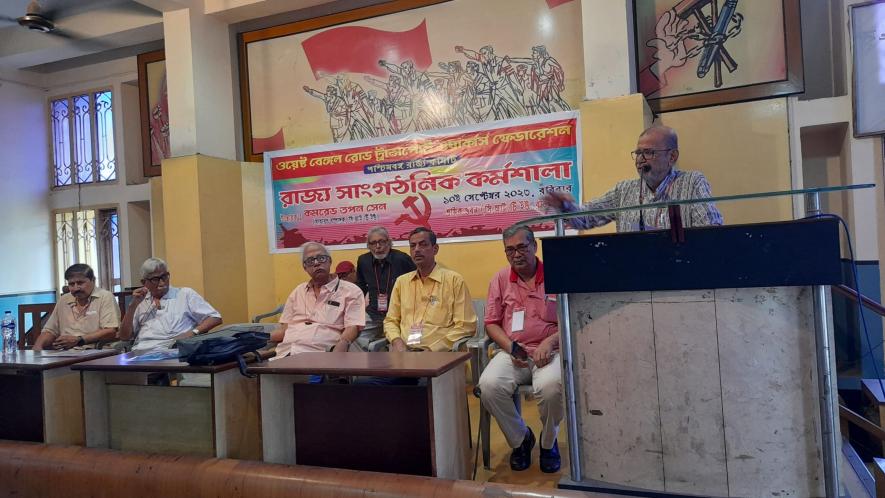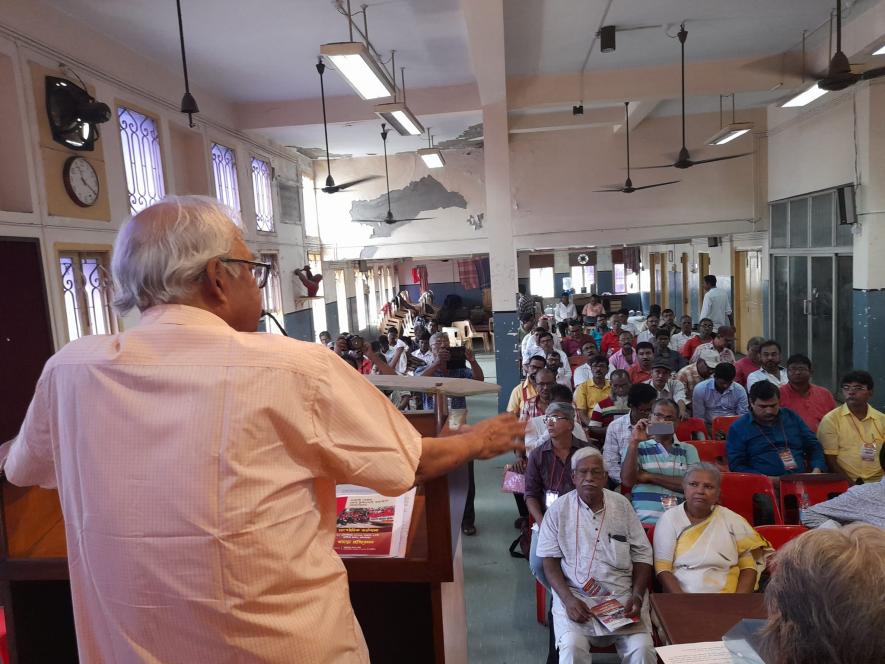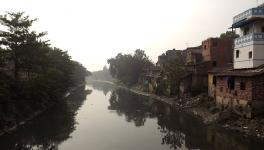Bengal’s Transport Workers Call for Agitation to Fulfil 14 Demands

The workers and employees of West Bengal’s transport sector have united in their 14-point demand to introduce a monthly minimum pension of Rs 9,000 in all transport sectors other than state transport.
The other demands include employment letters and identity cards, eight-hour work days, implementation of social security schemes, including health insurance, stopping the extortion by miscreants sheltered by the police and ruling party, measures to reduce the price of petroleum products, renovation of various roads, payment of bonuses and allowances before festivals, and government assistance in fixing passenger fares.
The demands were raised at a workshop of the West Bengal Road Transport Workers Federation held at the CITU state office in Kolkata on Sunday. CITU All India General Secretary Tapan Sen was present at the workshop.
Inaugurating the workshop, Sen said, "The sitting governments at the Centre and in the state are trying to enact the Labour Codes to undermine the earned rights of the working people by enforcing all lawlessness and irregularities in the name of rules for the benefit of the capitalists. There should be an outcry against it."
"To build the movement, more scope of organisation is needed. Our task at the moment is to spread the workers' movement on economic issues and educate ourselves politically. To inculcate in him the consciousness of the inevitability of social change for the emancipation of the worker and to activate him in its implementation,” Sen stated. He further said, "Transportation workers organisations initiated with a strong militant ideology are the demand of the hour. We have to move forward; the growing support of the left in the panchayat elections in the state is pointing in that direction. Based on this situation, a plan to build a realistic movement and organisation should be taken."
The All India General Secretary of CITU urged the state's transport workers to unite and forge an unceasing movement against the prevailing “autocracy”. He stressed the importance of remembering various incidents and the valour displayed in the past by workers’ movements. Claiming that transport "chakka jam" would mean "country jam”, he underscored the need for political education to amplify the awareness of the influence held by transport workers.

CITU leader Nepal Deb Bhattacharya presented a draft report at the session stage. He said, "This is a time of crisis as well as opportunity. Our colleagues must reach out to transport workers at all levels."
CITU West Bengal Committee General Secretary Anadi Sahu congratulated the delegates. He stated, "In the field of road transport, administrative tyranny persists throughout the country, including in our state. It has become particularly excessive here. The ongoing anarchy has severely affected transport workers, effectively turning them into mere employees. This chaos is especially pronounced within the private transport sector, where extreme discrimination prevails in recruitment, working hours, and other aspects. It appears there's a concerted effort to strip away the rights they've gained. Our protest is aimed at countering this. To effectively organise this protest, we must strengthen our own organisation."
A presiding committee, consisting of CITU State President Subhas Mukherjee, Ramprasad Sengupta, and Jahar Ghoshal, was formed to oversee the meeting. Subhash Mukherjee, on behalf of this praesidium, brought attention to various types of road transport vehicles. Nepal Deb Bhattacharya elaborated on key points during this discussion. Representatives from the labor sector of road transport, divided into four groups, engaged in deliberations.
At the conclusion of the discussions, Subhash Mukherjee and Nepal Deb Bhattacharya, representing the praesidium, unveiled a seven-point organisational program. They also highlighted a 14-point demand for road transport workers at all levels and outlined five demands for the overall welfare of the state's transport sector. The workshop called for a massive movement to fulfil these demands.
The organisation's flag was raised at the outset of the workshop. CITU West Bengal Committee President Subhash Mukherjee hoisted the flag. Tapan Sen, the federation's General Secretary Nepal Deb Bhattacharya, Working President Ramprasad Sengupta, All-India leader of the federation Deepak Dasgupta, state leader Jeeban Saha, and other leaders from various districts paid their respects at the martyr's memorial.
Get the latest reports & analysis with people's perspective on Protests, movements & deep analytical videos, discussions of the current affairs in your Telegram app. Subscribe to NewsClick's Telegram channel & get Real-Time updates on stories, as they get published on our website.























